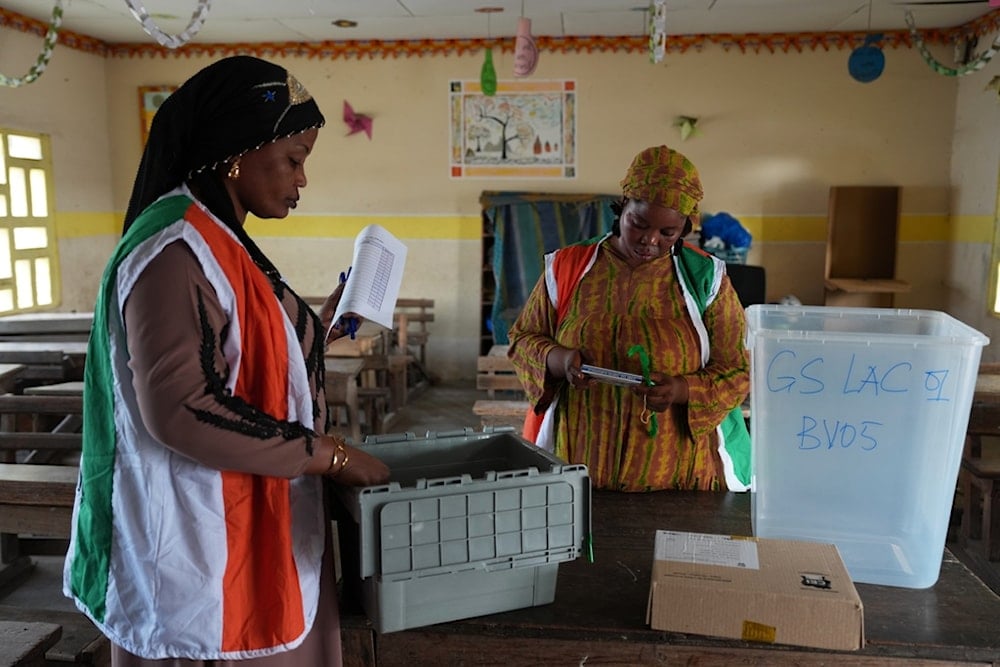Ivory Coast holds presidential election as Ouattara seeks fourth term
Ivory Coast is holding a tense presidential election as 83-year-old president Alassane Ouattara seeks a fourth term.
-

Electoral officials prepare for presidential elections in Koumassi, Ivory Coast, Saturday, October 25, 2025. (AP Photo/Misper Apawu )
Ivory Coast began voting on Saturday to choose its next president, with longtime leader Alassane Ouattara seeking a fourth consecutive term in a race marked by tension, discontent, and questions over democratic legitimacy.
Polling stations opened at 8:00 a.m. local time (0800 GMT), with nearly nine million voters expected to cast their ballots before polls close at 6:00 p.m. Vote counting is scheduled to begin immediately afterward.
The 83-year-old Ouattara, who has governed the world's largest cocoa producer since 2011, faces four challengers, including Simone Gbagbo, the former first lady, and Jean-Louis Billion, a former commerce minister. Both have promised to tackle unemployment and revive the agricultural sector, appealing to voters frustrated by persistent inequality despite more than a decade of robust economic growth.
A victory would extend Ouattara's rule to nearly two decades, further consolidating the dominance of his party, the Rally of Houphouetistes for Democracy and Peace (RHDP), which currently holds 169 of the 255 parliamentary seats.
Ouattara’s fragile legacy
Once a deputy managing director at the International Monetary Fund, Ouattara is credited with leading Ivory Coast's postwar reconstruction and maintaining an average 6% annual growth rate, driven by public infrastructure projects and a booming cocoa industry. His allies hail him as the guarantor of stability in a country long troubled by political crises.
Yet critics contend that his extended stay in power represents "third-termism" by another name, reflecting a broader pattern of constitutional manipulation across West Africa. Several opposition leaders and analysts, including some cited by Reuters, have warned that Ouattara's decision to run again undermines democratic norms and could trigger unrest similar to the 2010-2011 crisis, which killed at least 3,000 people.
Despite steady economic indicators, disparities remain stark: roughly 37.5% of Ivorians still live in poverty, and youth unemployment is rampant. A Fortune report noted that younger generations, who make up the majority of the population, are increasingly skeptical of aging leaders and frustrated by the lack of opportunity.
Opposition suppressed
The pre-election atmosphere has been fraught. Authorities barred major figures such as Tidjane Thiam, the former Credit Suisse chief executive, and Laurent Gbagbo, the ex-president who still commands strong grassroots loyalty, from contesting the vote. Their exclusion fueled protests, leading to hundreds of arrests and dozens of convictions, including a recent court ruling sentencing 26 demonstrators to three years in prison, according to Associated Press.
To contain unrest, the government has banned unauthorized demonstrations and deployed over 40,000 security forces nationwide. Opposition parties have decried what they call a "climate of fear", with France 24 reporting that gatherings outside the five recognized political parties have been explicitly forbidden.
Observers warn that the stakes extend beyond Ivory Coast's borders. The election's credibility will influence regional stability in West Africa, a region already reeling from drastic political transformations, including in Mali, Burkina Faso, and Niger.
As Ivorians head to the polls, many hope the vote can pave the way for a peaceful transition, but others fear that political exclusion, economic inequality, and entrenched power could once again push the country toward crisis and confrontation.
Read more: Ivory Coast opposition launches daily protests ahead of election

 3 Min Read
3 Min Read









